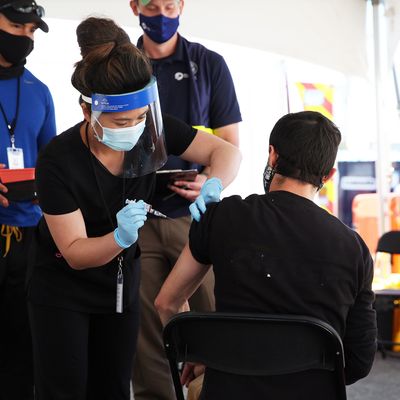
The Food and Drug Administration released an analysis Wednesday showing that a booster shot for the Johnson & Johnson vaccine may be beneficial but indicating that the agency hasn’t had time to independently verify the company’s claims. The FDA also noted the small sample sizes used in the data and said a test used in one study might not have been sensitive enough for the research.
The New York Times reports that the FDA released the analysis ahead of a Friday meeting of the Vaccines and Related Biological Products Advisory Committee. Johnson & Johnson is currently seeking an amendment to its emergency-use authorization that would allow for a second dose to be administered of the previously one-shot vaccine. Currently, only Pfizer’s COVID-19 vaccine has been approved for booster shots.
In the 54-page document, the FDA said Johnson & Johnson had submitted data from studies that looked into administering a second dose two to three months after the initial shot or a booster shot that would be given six months after the first.
“Although not independently confirmed by FDA from datasets, summaries of the data suggest there may be a benefit in a second dose administered approximately two months after the primary dose, when compared to the efficacy seen in the pivotal study COV3001,” the agency noted.
However, the FDA pointed out that the small sample size of people ages 60 and older “limits the ability” to come to a conclusion about an increase in efficacy in older individuals after a second shot.
One of Johnson & Johnson’s studies showed a significant immune response following a booster given six months after the initial dose. But the FDA said it might simply have been the result of the “low sensitivity” of the psVNA assay used.
Data show that the J&J vaccine does provide protection against death and severe COVID-19 disease, the FDA wrote. But the agency acknowledged that estimates of the shot’s effectiveness from various trials and studies are “consistently less than the highest effectiveness estimates for the mRNA COVID-19 vaccines.”
CNN reports that the FDA is expected to evaluate Moderna’s application for booster shots on Thursday and Johnson & Johnson’s on Friday. The agency is also scheduled to discuss the concept of mixing and matching vaccine types, a topic that has come up frequently in the context of the J&J shot —which isn’t an mRNA vaccine like Moderna’s and Pfizer’s.
A study from the National Institutes of Health, also released Wednesday, suggests that individuals that received a Johnson & Johnson shot originally might benefit more from a Pfizer or Moderna booster than another dose of J&J. Reportedly, all the recipients of a booster shot showed a higher immune response, but the mRNA shots produced a stronger response than the Johnson & Johnson booster.






























